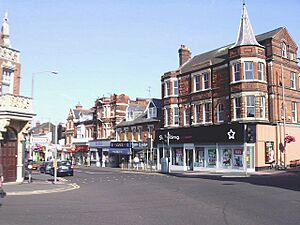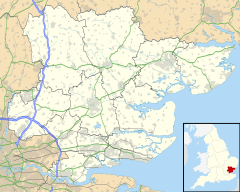Dovercourt facts for kids
Quick facts for kids Dovercourt |
|
|---|---|
 Town centre |
|
| OS grid reference | TM244308 |
| Civil parish | |
| District |
|
| Shire county | |
| Region | |
| Country | England |
| Sovereign state | United Kingdom |
| Post town | HARWICH |
| Postcode district | CO12 |
| Dialling code | 01255 |
| Police | Essex |
| Fire | Essex |
| Ambulance | East of England |
| EU Parliament | East of England |
| UK Parliament |
|
Dovercourt is a lovely seaside town in Essex, England. It's part of the Tendring area. This town is actually older than its nearby neighbour, the port of Harwich. Today, Dovercourt and Harwich are connected towns.
The name Dovercourt has old roots. "Dover" comes from an ancient British word, "dwfr," which means "water." The "court" part might have meant "land cut off by water." The town was first mentioned around the year 1000. It also appears in the famous Domesday Book from 1086.
Dovercourt is a popular place for holidays by the sea. It has many shops and cafes for both visitors and people who live there. The main shopping area is called The High Street. You can find all sorts of shops there, from small local ones to bigger national stores. The town is also easy to reach by train, thanks to Dovercourt railway station.
Contents
History of Dovercourt
Dovercourt has a long and interesting past. It was first mentioned over 1000 years ago! The town also played a small part in the English Civil War. This was a big conflict in England during the 1600s.
Guiding Ships: The Dovercourt Lighthouses
In 1863, two special lighthouses were built on the beach in Dovercourt. They are made of cast iron. These lighthouses helped guide ships safely around a tricky spot called Landguard Point. When the two lights lined up, sailors knew they were on the right path.
The lighthouses were used until 1917. Today, buoys in the water mark the deep channel for ships. The lighthouses were fixed up in the 1980s and are still a cool sight to see. Sometimes, people call them the Dovercourt Range Lights.
Dovercourt on TV: Hi-de-Hi!
You might be surprised to learn that Dovercourt was once a filming location for a famous TV show! The 1980s sitcom Hi-de-Hi! was filmed here. The show was about a holiday camp called Maplin's. The real place used for filming was Warner’s Holiday Camp in Dovercourt.
This holiday camp also has a very important history. In 1939, it was used to help refugee children. These children arrived in England as part of the Kindertransport mission. This mission brought thousands of children to safety from Europe before World War II. The camp later became a housing area called Hightrees.
Dovercourt in the News
If you want to know what's happening in Dovercourt, there are a few ways to find out. Local TV news is provided by BBC Look East and ITV News Anglia.
You can also listen to local radio stations like BBC Essex and BBC Radio Suffolk. Other stations include Heart East, Greatest Hits Radio Essex, Actual Radio, and Nation Radio Suffolk. For local news in print, the Harwich and Manningtree Standard newspaper comes out every Friday.
Gallery
-
Memorial to Captain Charles Fryatt, shot by the Germans in 1916
 | Bessie Coleman |
 | Spann Watson |
 | Jill E. Brown |
 | Sherman W. White |






